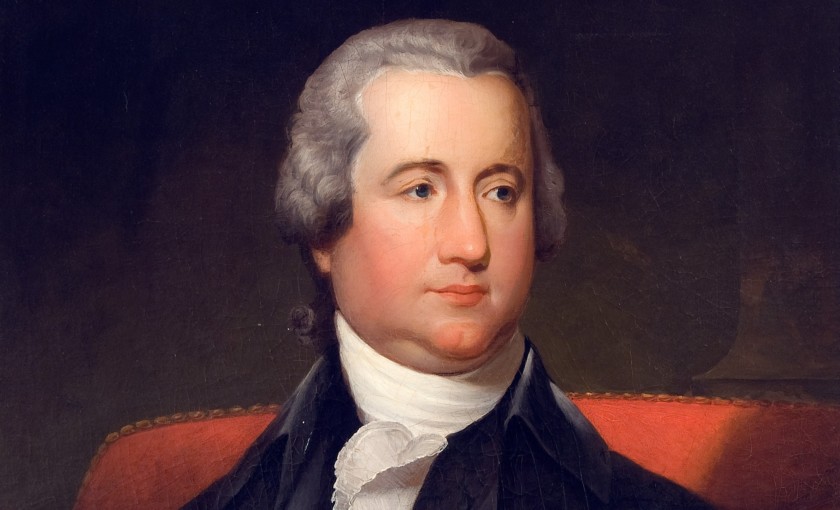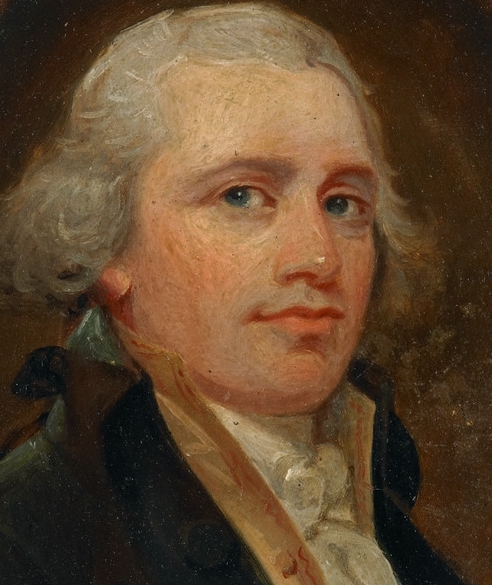The secret awaited its day.
She was pretty, in her early twenties, and distressed. Her husband had left her stranded in Philadelphia, she explained through her tears, and she needed just a bit of money to return to New York City and her family. She said she knew of the Secretary of the Treasury through the wastrel husband’s former employment as a commissary agent and his subsequent ties to the government. She said she knew the secretary was a kind man who could spare the money, a loan to be sure, and would doubtless want to help her. She told about her young daughter waiting in their small room.
The story touched Alexander Hamilton. He said to her that he would come by her room later that day, perhaps in the evening, to give her what she needed. She told him her name and gave her address. She was Maria Reynolds. In the custom of the time, she pronounced it Ma-rye-uh.

That evening he went wandering and paused before the stairs leading to her room. His wife Betsy and their children were in New York with her father, part of the plan to have them come to the new site of the capital in Philadelphia after he had settled in. Hamilton paused, but he finally climbed the stairs and tapped on the door. It opened, and he stepped inside. He had the money, he told her. She was standing very close. Her eyes told him it wasn’t only the money she wanted. Hamilton obliged.
Possibly James Reynolds knew from the beginning that his wife was having an affair with Alexander Hamilton. Some have concluded that James and Maria were partners in a “badger game.” That was the name for a scheme in which the wife lures the mark to her bed. Her “outraged” husband then barges in during the act and reluctantly agrees to keep the matter quiet, for a price. There is no evidence to support or disprove this is what happened, though Hamilton came to think that was exactly what happened. Certainly, letters between Hamilton and the Reynolds couple make plain that he visited her and that her husband knew of those visits. A subsequent pattern of blackmail bled Hamilton of a considerable sum of money for a year.
It is also apparent that if this were a badger game, it was a most unusual one. Hamilton incredibly continued to visit Maria after the blackmail commenced, and with the knowledge of James Reynolds. It was a sordid business. As much as he could, Hamilton kept Betsy out of Philadelphia and out of the way during the affair. Meanwhile, the extortion by Reynolds was only the start, as is always the case with these things. While her husband pestered Hamilton for additional “loans,” Maria wrote plaintive letters that appealed to Hamilton’s vanity and ironically aimed to animate his sense of honor. She cried often, but not all the time. Those were the times Hamilton liked best.
With their hooks deeply set, the shady pair enjoyed a pretty lucrative run. Selling Maria was, in fact, the most successful venture James Reynolds ever managed. For most of his life, he was a penny-ante crook whose stint as a commissary officer during the Revolution threw him in with people careless about how they made money. After the war, they involved him in a variety of financial intrigues, such as defrauding army veterans of their pay vouchers. Otherwise, Reynolds’s greatest accomplishment was marrying a pretty sixteen-year-old Connecticut girl who Hamilton (and others) later found fetching.
When Reynolds showed up in Philadelphia to “reconcile” with Maria, he not only squeezed Hamilton for hush money but also demanded a post in the Treasury Department. Matching Maria’s sense of irony, Reynolds claimed he would be an asset at the Treasury by snitching on colleagues. But Hamilton had enough scruples to deny Reynolds the job, if not enough sense to deny himself Reynolds’s wife. Everything, however, rapidly began to unravel in December 1792 when authorities arrested Reynolds for cheating veterans. He expected his benefactor in the Treasury to spring him, but Hamilton finally drew a line. Reynolds began dropping dark hints to his captors about information that would implicate Hamilton in corrupt Treasury practices. Hamilton’s enemies in Congress were all ears.
Pennsylvania congressman Frederick Muhlenburg visited Reynolds in jail, but the prisoner only made vague insinuations about Alexander Hamilton. Muhlenberg called in Congressman Abraham Venable and Senator James Monroe to help with the investigation.



The trio questioned Maria as well, but they could only determine that Hamilton had, for some reason, been giving James Reynolds money. They concluded what they thought was the worst, that Hamilton had enlisted Reynolds for speculations in government securities, arming him with insider information and giving him money for transactions. They could have gone to President Washington, but as gentlemen, they chose to confront the culprit in person. On December 15, the three marched into Hamilton’s office.
Hamilton invited his deputy, Oliver Wolcott, Jr., to witness the meeting. He and Wolcott listened to the allegations with stony faces, but Hamilton instantly decided to tell everything. He had engaged in no corruption, he insisted. He had not used Reynolds or anyone else to buy securities. He had not profited in any way from his government position. In fact, he claimed his government service had left him in bad financial straits. (This was true. Hamilton had to borrow from a friend to make the first payment to Reynolds.)
No, said Hamilton, he was not a speculator trading on insider information. He was an adulterer being blackmailed by a parasitic husband. He confessed that he had been paying hush money to Reynolds for months.
Every man in that room sat stunned by Hamilton’s confession. They so marveled over his candor that they could scarcely believe his story. Hamilton produced letters from Maria and James Reynolds as evidence. The trio looked them over and declared themselves satisfied that there had been no public malfeasance. Furthermore, they promised to keep everything secret. They considered Hamilton their political enemy, but this transgression was a private matter.
Their pledge of silence, of course, could be interpreted as the winking connivance of worldly men willing to shrug off Hamilton’s harmless fun with a comely woman who had an inconvenient husband. But that is not why those three men chose to remain silent.
Muhlenberg was a Lutheran minister, Monroe a committed moralist, and Venable a respected jurist. But they were not prudes. They knew how a man could wreck his reputation and ruin his life by enslaving himself to compulsive urges. And while it is impossible to know precisely how Hamilton’s confession struck them on a personal level that December day, the scene that followed that confession was surely cringe-inducing. The awkward silence as they passed around the tawdry notes from Maria Reynolds — pathetic in one phrase, seductive in the next, badly spelled throughout — must have made the soft rustle of her and her husband’s makeshift stationery deafening.

The documents revealed the soiled truth. The passion had passed as Alexander Hamilton found himself in an expensive prison whose warden was an oily husband. As Hamilton told his story, young Oliver Wolcott gazed at each of the men in that office in turn, Hamilton included, as it became plain that the real story was worse in its way than the one his accusers believed they had uncovered. Not until ten days after Betsy gave birth to their most recent child, a boy, had Alexander Hamilton finally told Maria Reynolds that he would not be returning to her bed.
Monroe, Muhlenberg, and Venable would not be returning to Hamilton’s office. There was, and there would be, the faint suspicion that he was lying about the affair, using it as a cloak so awful that no one could imagine anything worse, but Monroe and his colleagues believed that Hamilton’s soiled account was true. Monroe and the others gave their word that the matter was closed, but Monroe left the office with the letters. Hamilton seems to have thought he had no choice but to surrender them, but he likely recalled then— he certainly would later — Benjamin Franklin’s observation about secrets.
The other players in the drama finished their parts in the wings. James Reynolds ran like a rabbit, a final exit that achieved his nearly complete erasure from the record. Maria divorced him, helped by her lawyer Aaron Burr, and married her husband’s partner in crime, a former clerk in Hamilton’s Treasury Department. Betsy knew nothing, and by all evidence, neither did George Washington, ignorances preserved by the investigative trio’s decision to confront Hamilton personally rather than unmask him to his chief, and certainly not to his wife.
But Franklin’s warning about a secret — that two men can keep it if one of them is dead — awaited its day.

